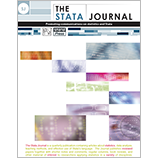Bayesian model averaging and weighted-average least squares: Equivariance, stability, and numerical issues
Abstract. In this article, we describe the estimation of linear regression models
with uncertainty about the choice of the explanatory variables. We introduce
the Stata commands bma and wals, which implement, respectively, the exact
Bayesian model-averaging estimator and the weighted-average least-squares estimator
developed by Magnus, Powell, and Pr¨ufer (2010, Journal of Econometrics
154: 139–153). Unlike standard pretest estimators that are based on some preliminary
diagnostic test, these model-averaging estimators provide a coherent way of
making inference on the regression parameters of interest by taking into account
the uncertainty due to both the estimation and the model selection steps. Special
emphasis is given to several practical issues that users are likely to face in applied
work: equivariance to certain transformations of the explanatory variables, stability,
accuracy, computing speed, and out-of-memory problems. Performances of
our bma and wals commands are illustrated using simulated data and empirical
applications from the literature on model-averaging estimation.
View all articles by these authors:
Giuseppe De Luca, Jan R. Magnus
View all articles with these keywords:
bma, wals, model uncertainty, model averaging, Bayesian analysis, exact Bayesian model averaging, weighted-average least squares
Download citation: BibTeX RIS
Download citation and abstract: BibTeX RIS
|
